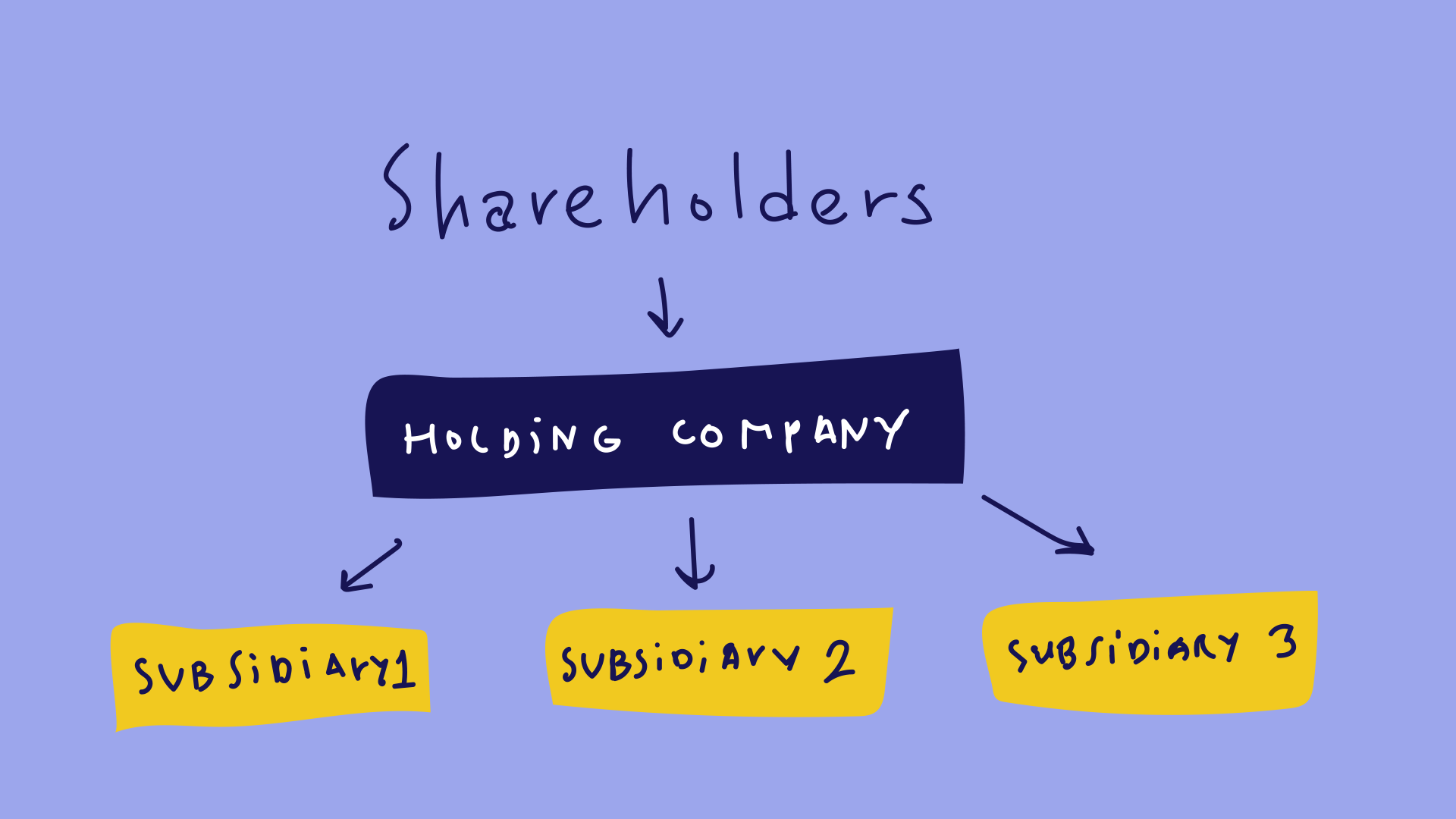What Is a Holding Company in the UK?
A holding company follows the same incorporation process as a normal company, although it provides different purposes for business owners. Understand what a holding company is and the tax advantages of one.

Often referred to as a ‘parent’ company, a holding company follows the same incorporation process as a normal company, although it provides different purposes for business owners.
We’ll give you a better understanding of a holding company structure, why you should choose the UK for incorporation, the tax advantages of a holding company, and how to set up a company in the UK.
So what is the meaning of a holding company? Let’s start here. A holding company is also known as an ‘umbrella’ or ‘parent’ company. This means that it has a bunch of ‘smaller children’ living under its hood. These are known as subsidiaries.
Setting up a holding company in the UK is relatively easy, as it does not provide products or services like a normal “parent” company would but simply owns the assets of those subsidiaries. The way holding companies work under this structure is also worth knowing if you’re considering this approach for your UK business. Holding companies oversee and manage their company’s management decisions without actively participating in their subsidiaries’ daily business operations (such as manufacturing, sales or providing services)
Skip to:
What Does a Holding Company Do?I’m Thinking of Setting Up a UK Holding Company, What Assets Can It Own?
When Will a Company Be Counted as a Subsidiary of My Holding Company?
Setting Up a Holding Company in the UK: The Benefits
Got Any Holding Company Examples?
Tax Advantages of Setting Up a Holding Company in the UK
How To Set Up a Holding Company in the UK?
What Does a Holding Company Do?

Every businessperson should be proactively seeking to mitigate risk, and that’s exactly where the structure of a holding company can play a positive role. Across industries and businesses of all sizes. Let’s explore that below.
Large Enterprises
Consider a large enterprise that offers a wide range of FMCG. Instead of having to establish as a single corporation - made up of separate divisions - it could be set up as a single holding company. Under this “parent” company structure, different business units become subsidiaries, each operating independently and largely autonomously (there’s a controlling interest owned by the holding company in each). Placing service and product offerings into subsidiary companies also allows large corporations to provide broader and more accessible services at scale. With that, comes growth.
Small businesses & individual entrepreneurs
Subsidiaries can be selective about how investors dedicate or allocate funds. This is an attractive aspect of holding companies for business owners prioritising social responsibility and sustainability among a socially conscious audience. Along with this, business expansion or the purchase of property also becomes more viable.
I’m Thinking of Setting Up a UK Holding Company, What Assets Can It Own?
Anything with a value can be owned by a holding company as one of its assets. If you’re setting up a holding company in the UK, here are a few examples of what those assets can include:
- Shares of stock in their subsidiaries or other companies
- Private equity funds
- Public stocks
- Bonds
- Real estate
- Limited liability companies
- Limited partnerships
- Brand names
- Patents
- Trademarks
When Will a Company Be Counted as a Subsidiary of My Holding Company?
A company will be counted as a subsidiary of a holding company if:
- The parent company owns more than 50% of subsidiary voting rights
- The parent company is a member of the subsidiary
- The parent company has the authority to make changes to the board of directors
In the UK, a holding company that owns more than 50% of another company’s shares is known as the ‘parent’ company of that company.
Setting Up a Holding Company in the UK: The Benefits
Checklist to prepare
To set up your company, here are some documents to get ready beforehand.
Apart from tax benefits, which are a big influencing factor for entrepreneurs to choose the UK for a holding company, there are a few different benefits of setting up a holding company in the UK. The first is that the UK provides a relatively stable legal, political and economic system and secondly, there is no minimum share capital (the money a company raises through the sale of shares by issuing common or preferred stocks). Before setting up a holding company in the UK, it’s worth exploring a few of these advantages in a bit more detail.
Got Any Holding Company Examples?
Good question. One of the best ways to understand the structure of a holding company and how they work is to identify an example you’re able to relate to. One such example of a holding company to best illustrate exactly that is Alphabet Inc.
Based in California, Alphabet Inc. is a well-recognised holding company known to many. What many may not know, is that this holding company has no business operations of its own. So what did Alphabet Inc. do to become one of the world’s most valuable tech companies? It became a parent.
Alphabet Inc. is the proud parent of Google and several former Google subsidiaries. Established in 2015, it’s fully driven by the earnings, cash flows, revenue and assets of these subsidiaries, including DeepMind Technologies, Google Fiber, CapitalG and Wing. Without its subsidiaries, Alphabet Inc. is just an ‘empty’ company but as a holding company, Wikipedia explains that it affords “greater autonomy to group companies that operate in businesses other than internet services.”
Tax Advantages of Setting Up a Holding Company in the UK
Let’s explore 6 advantages of a holding company and some of the main reasons the UK remains an attractive country for entrepreneurs to go down this avenue.
Low corporate tax rate
According to a UK government official release, the current corporate tax rate in the UK is 19%. This is considered to be an internationally low rate and a definite advantage of setting up a holding company in the UK.
Tax treaty network
Apart from the low tax rate, another one of the other notable benefits of a holding company is that the UK also houses the largest network of double tax treaties, worldwide. This entails having established treaties with various countries to avoid double payment of tax - when entrepreneurs in the UK deal with those, and others included on the treaty list.
The advantage of a holding company, in this case, becomes apparent as it can potentially reduce withholding taxes to zero or very low percentages. Usually, when a UK holding company or normal company owns more than 10% of the issued share capital of an overseas subsidiary, the rate for withholding tax on dividends paid by the subsidiary can be reduced to 5%.
Tax Exemption for Foreign Income Dividends (SMEs)
Small and medium-sized enterprises (SMEs) can receive a full exemption from paying taxes in foreign income dividends if dealings are done with a country that has a double tax agreement with the UK. The advantages for a holding company are realised only when the following criteria are met in the UK:
- The holding company must have less than 50 employees
- The holding company’s turnover should be less than €10 million
- The holding company's balance sheet total is less than €10 million
No Withholding Taxes
There is no withholding tax on the distribution of dividends to shareholders or holding companies, a benefit which applies even if the shareholder is not a UK resident.
Corporation Tax Exemption
Any subsidiary’s chargeable gains on disposals by the holding company are automatically exempt from corporation tax, provided conditions are met. This means a UK holding company can dispose of its shares without a tax liability if it owns at least 10% of ordinary shares in the subsidiary for 12 consecutive months (beginning no more than 2 years before the disposal date).
This only applies if both the holding and the subsidiary companies are actively trading for 12 months before and after disposal. The HMRC is stringent on these conditions (especially that 10% rule) so if you feel like chatting with one of our Osome accountants before you make any big moves, we’d love to help out.
Tax exemptions for VAT- taxable supplies
Another advantage of setting up a UK holding company is being able to enjoy VAT registration exemptions if its functions include:
- Continues acquiring shares in subsidiary companies
- Receives dividends from shares bought
- Disposes of shares in its subsidiaries
- Prevents itself and its subsidiaries from acquisitions from third-party companies
How To Set Up a Holding Company in the UK?
This process is relatively similar to opening a normal private or limited company. We’ll start with the basic information you’ll need at the ready to submit as part of your filing requirements:
- Your company name and registered office address
- Standard Industrial Classification codes (SIC)
- Director’s details (at least one)
- Shareholder’s details (at least one)
- Memorandum and articles of association
- Share information issued to shareholders
- Supporting documents for the use of sensitive words in the company name, if any
You will have to legally register your business at the Companies House for it to be considered and recognised in the name of the law.
Two Thoughts To Hold On to
Holding companies can be very advantageous for entrepreneurs in the UK due to location, tax rates, tax exemptions and extensive double tax treaty networks. Remember that a holding company is also subjected to corporate governance in the UK just like a normal company, and there are rules to follow.
Incorporating your company doesn’t need to be a hassle, leave all those rules to us! We’ve got a team of experts who’ll handle all the back-end business matters such as company formation, bookkeeping, and accounting for companies in the UK. We’re Osome like that.







